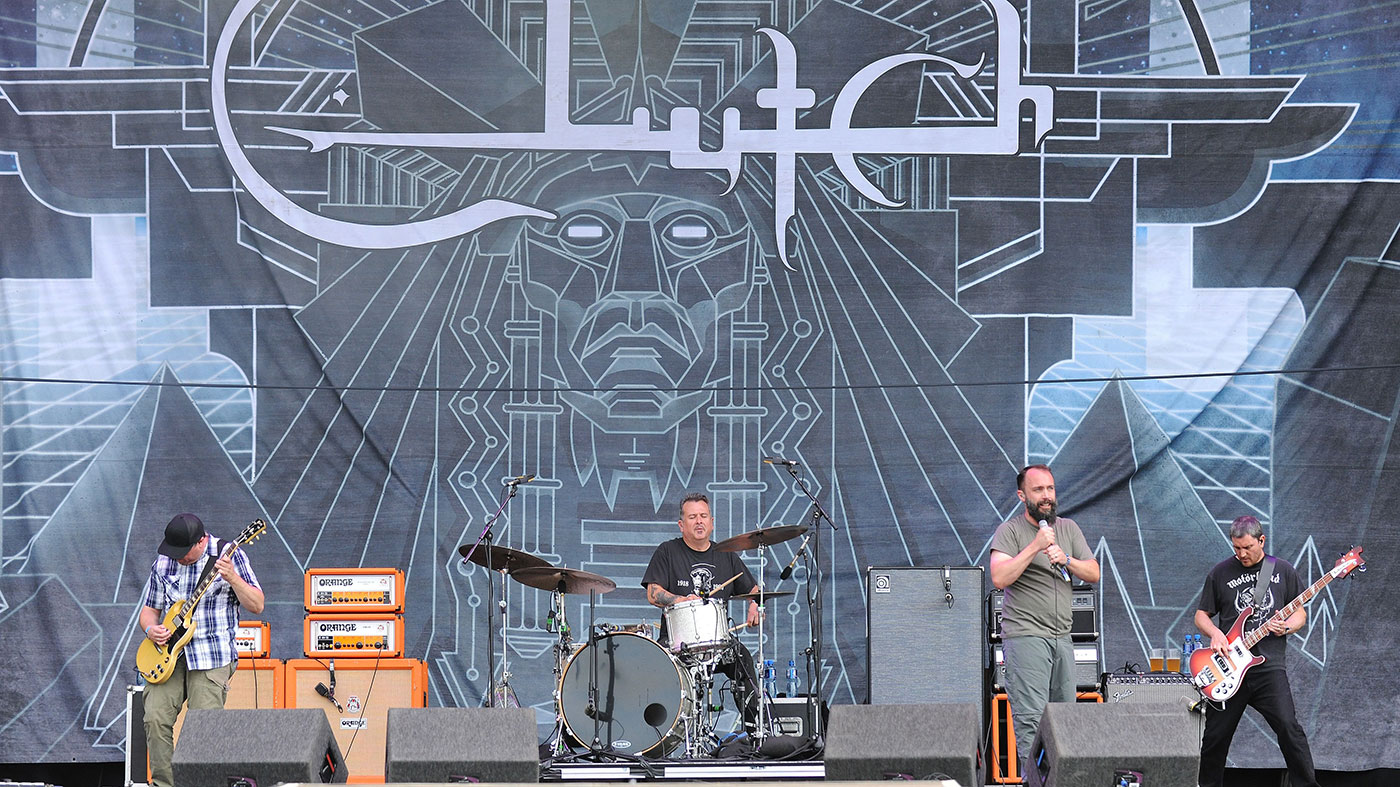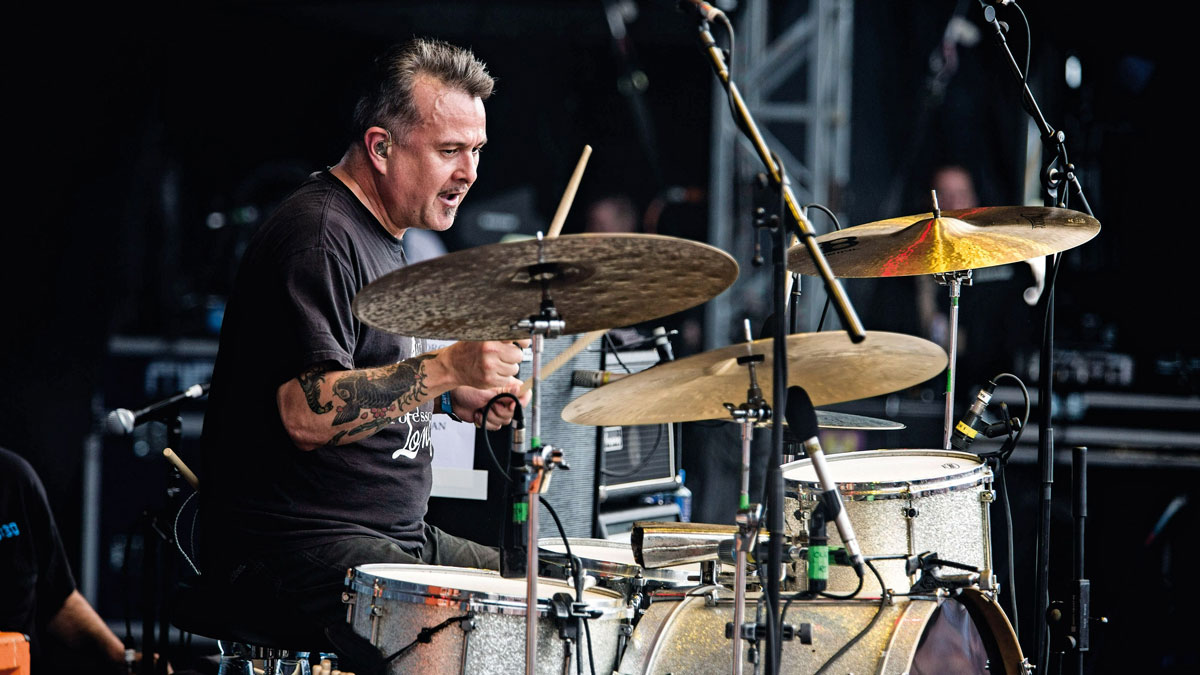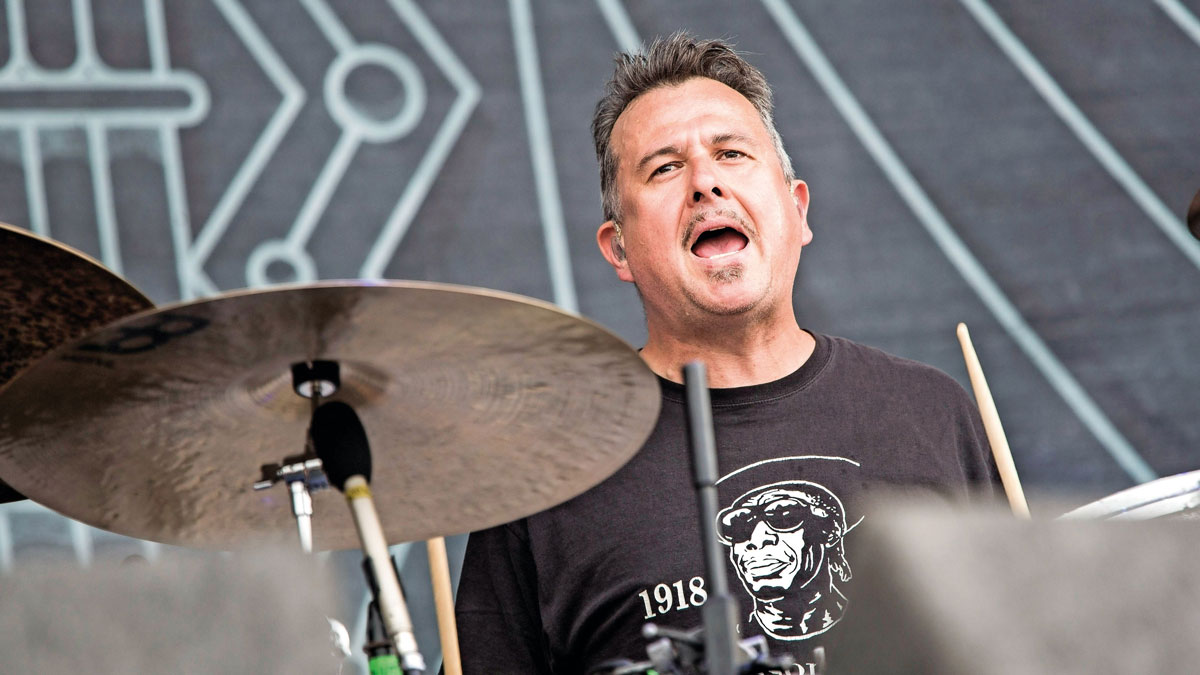Drummer Jean-Paul Gaster talks Clutch past, present and future
The mandolin-playing groove machine looks back on his career with Baltimore rock heroes Clutch

A career-retrospective from the groove machine
Jean-Paul Gaster gets plenty of love right here from MusicRadar, so it may seem odd to refer to him as an underrated drummer, but given there here is a musician that can just about do it all behind the kit, we’d say that the tag is justified.
For starters, Gaster is an absolute groove machine. Not since Phil Rudd have we heard a drummer that lays down such an unshakably fat and always on the money beat. But there’s plenty more to Gaster’s playing than just being a human metronome.
Clutch, themselves a band deserving a world more success than the cult status that they have found, have a back catalogue littered with records showcasing Gaster’s inventive kit work. Delve into their deep cuts and you’ll find the funky feel of the Washington DC go-go that engulfed Gaster in his formative years.
You also don’t have to look too hard to unearth the jazz-influenced rock playing of his early musical hero Bill Ward, and then there’s everything from hardcore to fusion thrown into his heady mix of playing style influences.
We caught up with Gaster as Clutch blew audiences away on the festival circuit, he was eager to look back on the drummer’s unmistakable style, the perils of record label demands and the unstoppable rock juggernaut that is Clutch.
When did you get your start on drums?
“I got my first drum kit when I was 16 and from there it was all about Black Sabbath and ZZ Top. We started to go and see shows and I saw hardcore shows, metal shows. Of course, growing up in DC too, we had this go-go scene. That was big for me as well.
"At that point to me, drums was drums. I could listen to Mackie play with the Cro-Mags or I could go see Ju-Ju House with Experience Unlimited. It was all drums to me. I could go see Elvin Jones play at Blues Alley. I would go see Ginger Baker play in Baltimore.
If you think you know something about the drums that probably means you don’t know anything about the drums.
"It was all drums, it wasn’t about being this kind of a drummer or this kind of a drummer. I just liked drummers and tried to take all of those influences and make my sound out of that.”
Who was the drummer that inspired you to play?
“I think one of the most eye-opening things was listening to Black Sabbath and playing along to those records. I realised that Sabbath was an incredibly heavy band but if you listen to Bill Ward it opens your eyes because I could hear all of these things that Buddy Rich was doing and things that Gene Krupa was doing.
"As a 16-year-old kid that was a kind blowing experience. I realised that the guy playing in a heavy metal band also knew about jazz. That knocked me out. In a lot of ways I credit Bill Ward with opening my mind and making me see the lineage of the drums. From Bill Ward I started checking out guys like Elvin Jones and Mitch Mitchell and Tony Williams.”
I realised that Sabbath was an incredibly heavy band but if you listen to Bill Ward it opens your eyes because I could hear all of these things that Buddy Rich was doing and things that Gene Krupa was doing. As a 16-year-old kid that was a kind blowing experience
Did you take lessons early on?
“I took a few lessons early on. I was not a good student at that point. I didn’t know how to practise. The teacher would come over and we would work through Carmine Appice’s Realistic Rock and I would try and do one page and he would help me out.
"Then I would put the book away and not look at it again until my next lesson. I did that for several months and it became obvious that it was not working. By that time we had started playing shows. We would travel to Richmond or Pennsylvania.
"It wasn’t until I had been on the road for a couple of years that I really decided that I wanted to learn this thing. There wasn’t a lot of stuff prior to the drums that I felt comfortable doing so I realised that this was what I wanted to do. I put all of my energy into it and wanted to learn everything I could about the drums.
"So, I went to the local music shop and spoke to my buddy and he told if I was really serious about learning drums to contact Walter Salb. Working with him opened my eyes on a lot of things. He wanted all of his drummers to be prepared for any kind of gig. He started in 1946 so he had a tremendous amount of knowledge. He showed me about discipline as well.
"Teachers can show you that but it ultimately has to come from the player. If you think you know something about the drums that probably means you don’t know anything about the drums.”
How quickly did you understand the importance of groove in your role as a drummer?
“Right away. My first musical experiences were going to see go-go shows and listening to Black Sabbath and ZZ Top. For me, drumming was groove.
"There was a very short period in my young drummer life where I thought I wanted to be a metal drummer, but that got really old, really quick. The playing fast beats all the time with double bass all over the place, I realised there are a whole bunch of other guys that do that way better than I can and it wasn’t interesting to me.
"The idea of playing as fast as you can and playing harder than everybody else, that wore thin. The idea of groove was there for me from the very beginning. We listened to a lot of hip-hop early on; Public Enemy and Run DMC, that was important to me and I would spend as much time playing along to Public Enemy as I would to playing to Black Sabbath.”

Breaking through
Clutch formed in the early ‘90s and it looks like you got very serious, very quick
“We worked very quickly. As soon as we had a batch of tunes together we went in and cut our first seven inch. That happened within a couple of months of being in a band.
"I had a drummer friend of mine called Chris and he told me about going into the studio. He said, ‘When you go in the studio, just hit the drums as hard as you can.’ So that’s one thing I did. I got in there and tried to make them sound good and loud.
I had a drummer friend... He said, ‘When you go in the studio, just hit the drums as hard as you can.’
"From there, I learned a lot about the studio. I feel much more comfortable in a live environment. I think the band is getting better at recording in the studio, I think I am getting better at it.”
You feel that you’re still learning?
“I am always learning. Otherwise it would be very boring. We are lucky enough to have a career and make a living. It would be pretty easy to coast now if we wanted to. We could probably do that and squeeze a few more years out of this thing. But that’s not interesting to me. I have no interest in coasting. I want to try new stuff. The band right now is working on new material.”
How do you challenge yourself creatively?
“I’ve picked up the mandolin. I’ve tried to play a string instrument my whole career and I’ve never been good at it. I tried guitar, I tried bass, I tried things like trumpet and keyboards. For some reason I enjoy that mandolin.
I’ll write riffs on the mandolin and then show them to the guys and they play them on their big boy guitars. That’s fun and it also informs how I play the drums and how I look at the music. Just last night I was trying to play a shuffle on the mandolin. I enjoy that. You’ve got to constantly challenge yourself and try new stuff. If you get bored with playing the drums then you’re not looking.”
I’ll write riffs on the mandolin and then show them to the guys and they play them on their big boy guitars.
How was your approach to drumming changed since Clutch’s early days?
“Recording the self-titled record was big for us, it changed the way we looked at music. We found our sound on that record. That happened because we toured so extensively on the record before that, Transnational Speedway League. On that touring cycle we had the opportunity to play with Monster Magnet, Sepultura, Prong, Bad Religion, we did a whole tonne of headline shows. We played probably 250-300 gigs off that first record alone. We were touring in a van. We learned how to play our instruments at that point.
“We also began to mess around with improvisation because all of our favourite music involves that, whether it be Jimi Hendrix or the Allman Brothers. We wanted to do our version of that. We started improvising and that had a lot to do with the band developing our sound. As players it is very important to do that, especially as a drummer.
"Improvising is what the drums are about, it’s putting out that rhythm and just listening to the other guys and making them feel comfortable. Those early days were kind of crazy in that a lot of bands were getting signed. For whatever reason, these labels came out of the woodwork and we immediately started doing major label records.
“We certainly weren’t going to turn that down. We learned a lot from those experiences. Being on a label wasn’t easy. It was always a frustrating experience. A good part of the ‘90s and early ‘00s was spent battling with these labels. That is very uninspiring.”
Did you encounter a lot of label interference?
“They always wished we would write a radio song. To be honest, we tried. We would do a song with some kind of an intro, verse, chorus and maybe a bridge. We would do that and think it was great and it would end up being American Sleep. The label would look at us kind of cross-eyed and they’d say, ‘This is your radio song?!’
"We learned that even when we tried to write something for the label, we don’t have those chops. We are not that band, it is not in our vocabulary. That was as frustrating for the labels as it was for us.”
Is that partly why the band started its own label in 2008?
“For sure. By the time we finished our obligation to DRT Records we realised that there was no way we could sign to another label. Even if we started our own label and did a terrible job, it would be better than being on any other label. We’re still learning, we still make mistakes.
"Those are lessons that I’m ok with learning. I enjoy doing the label stuff. I often go to the warehouse and I’ll pack up boxes of vinyl, put them on pallets and ship them out. I like doing that stuff."

Latter days
By the mid-to-late-2000s you had really hit your stride with albums like Blast Tyrant and Strange Cousins From The West
“We did [Strange Cousins…] in Baltimore with J Robbins. We had recorded with him before, but this time it was at his studio. I played a Gretsch drum kit on that one. It was also the first record we had done with an organist. We went back to just a four piece.
"That was an important record. We tried to do some new things without having those other layers of music happening. I’m very proud of that record.”
You followed it up with Earth Rocker, a record that played with the Clutch signature sound a little, becoming a little faster in tempo
“For Earth Rocker we went back to working with Machine. He had produced Blast Tyrant. Machine’s method of recording was, for us very different at that time. He was a guy who had us play to clicks. He was very involved with the arrangement of the tunes. To this day, Machine can say things to this band that no one else can [laughs].
"That was a record put together in the studio. I cut those drums to the demos, the other guys weren’t in the room with me. That was the first time I had done that. It was just me, Machine and the tracks. I won’t say it’s the best way to record a record and I don’t think it is the worst way either.
"We did Psychic Warfare with Machine as well. On that one we made an effort for the band to play together. That pushed him as much as it did us with Earth Rocker. We were insistent to keep it organic. The drum sound reflects that, it is a less-processed sound. We’ve experienced a lot of success from that record.”
Do you enjoy playing to a click in the studio?
“I didn’t always play to a click in the studio, but on the last couple of records we have. Often when we’re writing I have a click going all the time. As soon as there is a riff I get my phone out and start tapping away and I find the tempo of the tune. There’s something happens where we get into a room and start jamming and something happens, it comes to life and feels great.
"You record the idea and listen back and say, ‘What just happened? It sounded so good before!’ A lot of things can happen. There is an energy there in those initial stages and that brings a tendency to rush. It feels good and you think it will feel even better if you play faster.
"It is amazing what a couple bpm can do to a groove. If you have a jam at 88bpm, you record it and you might think you can try 90bpm. You can have a real conversation about it because it is a real tangible thing, you’re dealing with a number.”
When we’re playing live I look at the other guys, I look at the audience reaction and then I build my drum parts.
Are you fluid at all with the tempos when playing live?
“When we’re playing live I look at the other guys, I look at the audience reaction and then I build my drum parts. Even recently I have played, for instance, ‘Quick Death In Texas’ and I am playing that song a little differently to the record.
"After playing it live the pulse has changed a little, it swings a little more. I let the drum part develop naturally. I don’t say, ‘This is going to be so dope because I’m going to do this fill here and a hi-hat bark here.’ I don’t do any of that stuff. Just let the tune develop on its own.”
You’re someone who has always played a stripped-back it, were you ever tempted to add some extra toms in there?
“I’ve always played a four-piece kit. I’ve always had a ride, a crash that I can ride on, a pair of hats and maybe another ride or crash. For me, all of my cymbals are crashes, all of my cymbals are rides.
"I picked that up early on from guys like Elvin Jones and watching him change the ride voice depending on what was happening. I prefer to play less stuff but have more sounds available to me.”
What is the biggest challenge that comes with being Clutch’s drummer?
“I’m not sure there is anything that has been tricky, but I do look at the way I play with the guys differently to how I did years ago. I am much more sensitive to the vocal these days.
"For me, the vocal is everything and that really informs how I play the groove. If you look at a given audience there are maybe 1,000 people in the crowd. You might have a handful of drummers and a handful of bass players, but I’d be willing to bet that 95% of those people sing. Whether that is singing in the car or maybe they are musicians too.
"The vocal is the most important part and I am very aware of that. When I’m making these decision it is all about how to best support the vocal. That evolves too. The parts I write in the studio are not the parts that I play live.”
Rich is a teacher, one time Rhythm staff writer and experienced freelance journalist who has interviewed countless revered musicians, engineers, producers and stars for the our world-leading music making portfolio, including such titles as Rhythm, Total Guitar, Guitarist, Guitar World, and MusicRadar. His victims include such luminaries as Ice T, Mark Guilani and Jamie Oliver (the drumming one).
